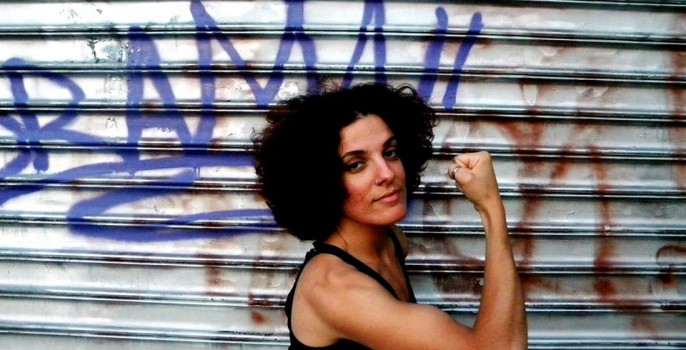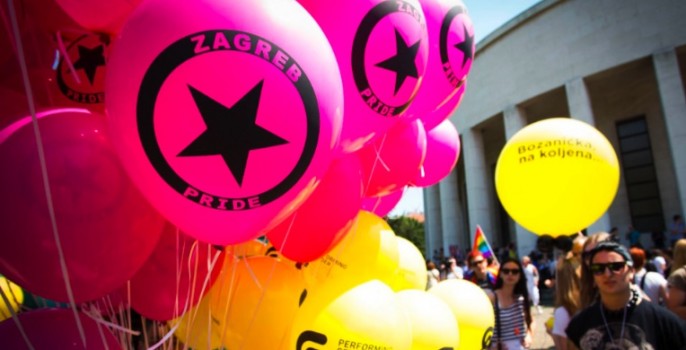As part our coverage on International Women’s Day 2014, we asked feminist activists in different countries to express their opinions, experiences and outlooks, in honour of March 8.
Photo: Milena Abrahamyan, contributor from Armenia & NYC
Egypt
“Egypt, as a conservative closed religious country, has a specific image on the hierarchy within its society. If you are not a heterosexual male in Egypt, you will definitely be discriminated against. And with the all the political and economical problems Egypt is having over the past years, people have started to express their feelings out very violently, and because they are still not able to face the authorities, they started taking it out on those who they believe they are the weakest links which are LGBTI and women. They believe when they do assault these categories, authority will be on their side this time, which is true. Now a lot of rape cases, sexual assaults, physical and verbal harassment, and attacks on Feminists and LGBTI groups and centers is happening in Egypt, and the authorities and media end up doing nothing as they believe that these groups are effecting public morals and traditions, and because they are very busy fighting political activists, they leave Feminists and LGBTI activists for the society to deal with.
As a Feminist and lesbian activist, I feel that my goal is to try to tie the two cases together and work on both of them. I believe that if I don’t have my full rights as a woman, my rights to have proper education, proper health treatment, political rights, the right to control my own life and make my own choices, I will not be able to express my gender and sexuality freely. Also if I skip all that and just focus on LGBTI problems like criminalizing it or the right in marriage and adopting, I will still be discriminated against as a woman. It is basically like a chain and each end is linked to the other, either we keep it tied up or break it and make it easier for anyone to step in and destroy all our hopes and dreams.”
– Maha Youssef, Bedayaa Organization for LGBTQI of the Nile Valley Area
Switzerland
“If feminist and LGBT activism aim at transforming power relations, we have to ask ourselves what justice entails for whom. Switzerland was comparably ‘late’ in its political and legal recognition of women and is still reluctant to fully recognize LGBTI claims. Whilst it is tempting to reduce March 8 to a celebration of measurable feminist achievements such as anti-discrimination legislation or principles that make inequality comparable such as the gender pay gap, why not think about those women whose experiences have been outside of what has been accomplished. On March 8, it deems important to broaden our understanding of justice and violence. Many experiences of sexism and queerphobia cannot be accounted for in the existing legalistic framework yet they still matter.
As LGBTI and feminist activists, we have to ask ourselves who we are allowing to set the political agendas. If Swiss feminism is so concerned with women’s economic independence and the gender pay gap, which in Switzerland currently hovers around 20%, why are we not concerned with the precarious labour conditions of sex workers and domestic workers? And what about the specific difficulties trans women, non-conforming genders or lesbians face in the work place? The discrimination Muslim women have to deal with, especially if they dare to wear a headscarf?. These are all feminist issues that have not made it on the mainstream feminist -or LGBTI- agenda in Switzerland.
Intersectional workings of queerphobia and sexism are particularly difficult to contest if the subjects who represent them are always marked as ‘marginal’. Queer-feminist activists worldwide have shown that a critique of power relations -also within feminist and LGBTI movements- has to go hand in hand with their political claims. In Switzerland this became particularly pertinent in 2009 when the country voted in favor of banning minarets. The campaign led by the Christian-Conservative front was using gender equality as an argument to push through their racist agenda. The violence against Muslim women and queers emerging from that campaign was subsequently contested by anti-racist feminist activists and researchers.
March 8 therefore is an opportunity to come together and think about the power relations that inform our work as feminist and LGBTI activists. It starts with who is allowed to take part in the marches, whose claims are deemed important and whose have ‘no priority’. Creating justice is also a result of power relations.”
– Maria von Känel, General Manager of the Swiss Rainbow Families Association and co-founder of NELFA (Network of European LGBT Families Associations) & Stefanie Boulila, a Swiss queer-feminist researcher from the University of Leeds
Japan
“Lesbian, bisexual women and transgender people have always been in women’s movements. Those of us who fight against homophobia and transphobia believes in women’s rights regardless of one’s sexual orientation, sexuality, gender identity, gender expression or bodily diversity. On this day, let’s celebrate diversity among women all over the world.
Happy International Women’s Day from Japan!”
– Azusa Yamashita, Co-Secretary General, International Lesbian, Gay, Bisexual, Trans and Intersex Association (ILGA)
Armenia
“March 8th is ultimately about fighting for respect. It is not, as is common practice in Armenia, about giving flowers to women to highlight how fragile and beautiful they are. We shouldn’t live in a world where our only value is beauty, and where we are deemed fragile creatures to be protected, especially when we certainly aren’t protected from the violence of patriarchy.
To me, feminism is simply put the act of loving women, which ultimately means loving humanity. This is meaningful to anyone who has ever loved a woman not for being their sister, not for being their mother, not for being their wife or lover, but for being a human being. When girls are harassed in their own homes, when young women are shamed for expressing their sexuality, when women are subjected to violence by their husbands or partners, when feminists fighting for women’s rights to equal status in society are attacked by street mobs, when LBTI identified women are harassed, attacked, discriminated against at all levels of their lives, we are given a clear message that we live in an anti-woman world. The kind of love this world wants to give women is rooted in dehumanizing them to the level of sexual objectification or submissive servants. This is not love. This is disrespect.
March 8th is my everyday, the conscious act of loving women, and thereby loving and respecting what is human.”
– Milena Abrahamyan, Armenia & NYC
If you would like to add your voice, email us at contact@dayagainsthomophobia.org


